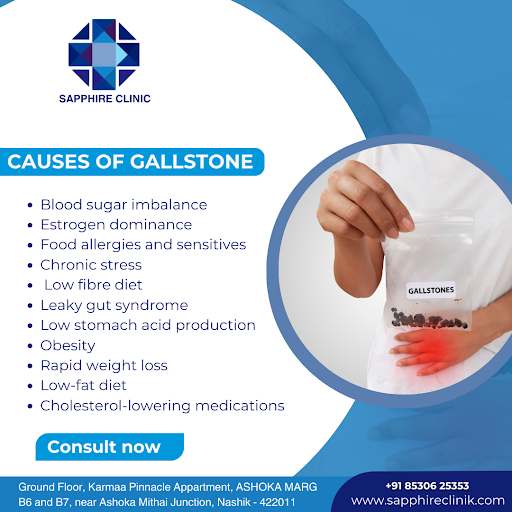Gallstones are hardened bile deposits in the gallbladder that can cause symptoms like abdominal pain, nausea, and vomiting. While some people experience no symptoms, others may need treatment. Dr. Abhinandan Jadhav at Sapphire Superspeciality Clinic in Nashik highlights key causes of gallstones, including blood sugar imbalance, estrogen dominance, food allergies, chronic stress, low-fiber diets, leaky gut syndrome, obesity, rapid weight loss, low stomach acid, and cholesterol-lowering medications. Understanding these factors is essential for prevention and early treatment.
1. Blood Sugar Imbalance
Gallstones can develop as a result of elevated blood sugar levels, which are frequently linked to diabetes or insulin resistance. Elevated blood sugar levels raise the bile’s cholesterol content, which may ultimately cause stones to develop. Gallstones can be avoided by controlling blood sugar levels with food, exercise, and medication.
2.Estrogen Dominance
Excess estrogen in the body, which can occur due to hormone imbalances or certain medications (e.g., birth control pills or hormone replacement therapy), increases the risk of gallstone formation. Estrogen can cause the liver to produce more cholesterol, which may contribute to the development of gallstones.
3.Food Allergies and Sensitivities
Chronic food allergies or sensitivities, particularly to fatty or greasy foods, can disrupt bile production and secretion. This disruption can cause bile to become thicker, leading to gallstone formation. Identifying and managing food allergies or sensitivities through an elimination diet can be beneficial.
4.Chronic Stress
Long-term stress is known to impact various body systems, including digestion. Stress can cause hormonal imbalances, which may lead to increased bile cholesterol levels. Stress management techniques such as meditation, yoga, and regular exercise can help reduce the risk of gallstones.
5.Low Fiber Diet
A diet low in fiber can lead to poor bile flow and bile acid production, which increases the likelihood of gallstone formation. Consuming a high-fiber diet, rich in fruits, vegetables, whole grains, and legumes, promotes healthy bile production and digestion.
6.Leaky Gut Syndrome
Leaky gut syndrome occurs when the lining of the intestine becomes damaged, allowing toxins and undigested food particles to enter the bloodstream. This condition can trigger inflammation and affect liver function, increasing the risk of gallstone development. Healing the gut through proper nutrition and probiotics can help manage this risk.
7.Low Stomach Acid Production
Low stomach acid can impair the digestion and breakdown of fats, leading to the accumulation of undigested fats in the liver, which may contribute to gallstone formation. Ensuring optimal stomach acid levels through diet and lifestyle changes can help prevent this issue.
8.Obesity
Obesity is one of the most common risk factors for gallstones. Excess body weight leads to higher cholesterol levels in the liver and bile, increasing the chances of gallstone formation. Maintaining a healthy weight through regular exercise and a balanced diet is essential for gallstone prevention.
9.Rapid Weight Loss
While weight loss is beneficial for health, rapid or extreme weight loss can increase the risk of gallstones. When the body loses weight too quickly, it releases excess cholesterol from fat stores, which may form gallstones. Gradual weight loss through a well-balanced diet and exercise plan is a safer approach.
10.Low-Fat Diet
A diet too low in healthy fats can impair the function of the gallbladder, leading to reduced bile production. This reduction in bile flow can contribute to gallstone formation. It is important to include healthy fats, such as those from avocados, olive oil, and nuts, in your diet for proper gallbladder function.
11.Cholesterol-Lowering Medications
While cholesterol-lowering medications can be helpful for managing high cholesterol levels, they can also increase the risk of gallstone formation. Statins, in particular, can elevate cholesterol levels in bile, leading to the development of stones. If you are on cholesterol medication, it is important to monitor your gallbladder health regularly.
Conclusion:
Gallstones can be a painful and uncomfortable condition, but many of the factors contributing to their formation can be managed with lifestyle changes. Dr. Abhinandan Jadhav at Sapphire Superspeciality Clinic in Nashik recommends maintaining a balanced diet, managing stress, and addressing underlying health issues to reduce the risk of gallstones. If you suspect you may be at risk for gallstones or are experiencing symptoms, consult with Dr. Jadhav for personalized treatment options and expert care.
Schedule a Consultation:
If you are concerned about gallstones or experiencing symptoms, book an appointment with Dr. Abhinandan Jadhav at Sapphire Superspeciality Clinic in Nashik. Take proactive steps towards your digestive health today!


